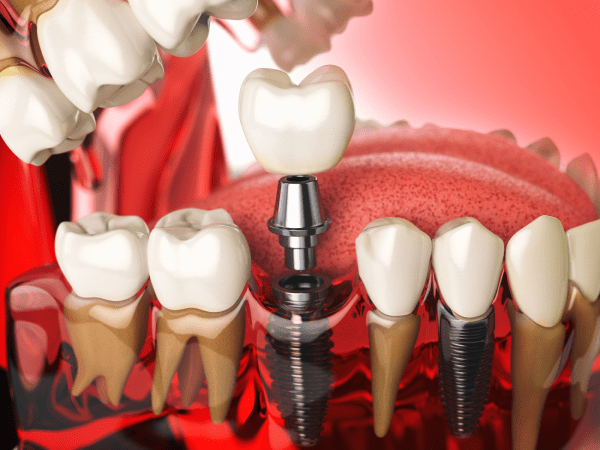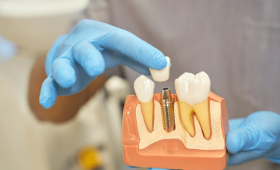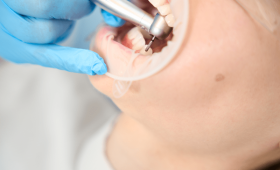Is Age a Barrier for Dental Implants?
In dental implant treatment, chronological age alone is not a barrier. What is important is the patient’s overall health and whether the jawbone is strong and healthy enough to support the implant. Whether you are 20 or 80 years old, if you are in good general health and have sufficient bone volume, you can be a successful implant candidate. Outside of children and adolescents, due to the completion of jawbone development, age is not a direct factor affecting implant success in adults. Practitioners focus on the patient’s physical condition to withstand the surgery and the quality of their bone.
Can Dental Implants Be Placed at a Young Age?
Placing dental implants at a young age depends on the completion of jawbone development. Generally, jawbone growth stops after the age of 18, and a suitable foundation for an implant is formed. Placing an implant during the growth period can negatively affect the development of the jaw and cause misalignment of the teeth. Therefore, when planning treatment for young individuals, it is essential that the dentist ensures that bone development is complete. The practitioner performs detailed radiological examinations to determine the most suitable timing for the implant treatment.
Are Dental Implants Risky for Elderly Patients?
Dental implant treatment for elderly patients may carry some specific risks due to chronic health issues or their overall physical condition. However, these risks are generally manageable and do not pose a barrier to treatment. For example, if conditions like heart disease, diabetes, or osteoporosis are under control, elderly patients can also successfully receive implant treatment. The recovery process may be slightly slower than in younger patients, but this does not prevent a successful outcome.
How Does Being Toothless at an Advanced Age Affect the Jawbone?
Being toothless at an advanced age can lead to jawbone resorption and a decrease in bone volume. Without the stimulation provided by tooth roots, bone tissue is lost over time. This can create a problem where there is not enough bone for implant placement. However, with modern dental procedures like bone grafting and sinus lifts, these problems can be overcome. These additional procedures create a solid foundation for the implant and make implant treatment possible even in advanced age.
How Quickly Do Young Patients Recover from Implant Treatment?
In young patients, the body’s capacity for regeneration and healing is higher. Therefore, the recovery process after implant treatment is generally faster and smoother. The process of osseointegration, where the bones fuse with the implant, can be completed in a shorter time in young and healthy patients. This speeds up the overall treatment process and allows patients to get their permanent teeth sooner.
How Does Bone Density Change with Age?
Bone density can naturally decrease with age, and this is more pronounced in women after menopause. Low bone density can make it difficult to place the implant stably. However, dentists use special tomography and X-ray images to evaluate this condition. If necessary, bone grafting procedures before the implant can increase bone volume and density.
What is the Success Rate of Implant Treatment in the Elderly?
The success rate of dental implant treatment in elderly patients is over 95%, similar to that of younger patients. The key to success is good management of the patient’s overall health and a meticulous treatment plan by an experienced dentist. Although the recovery period may be slightly longer, implants can be used for many years without problems when placed correctly and if the patient maintains good oral hygiene.
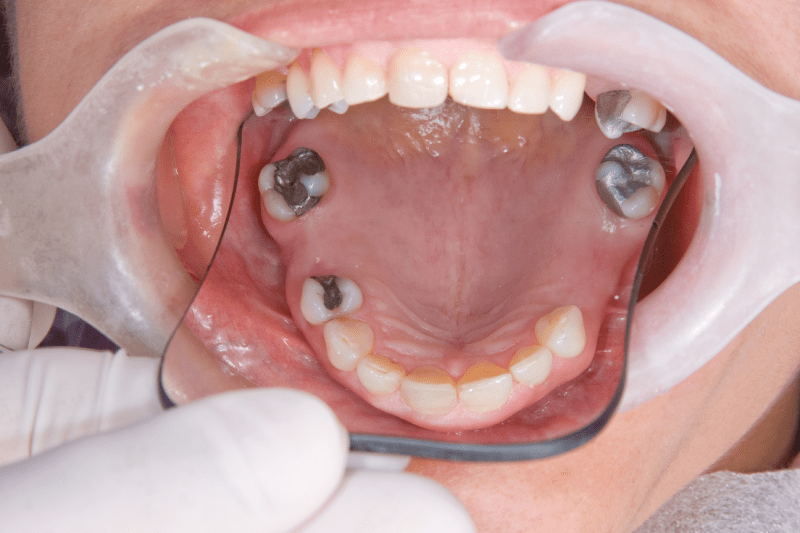
Does Diabetes Affect Implant Treatment in the Elderly?
Uncontrolled diabetes, just like at any age, negatively affects the success of implant treatment in the elderly. High blood sugar levels slow down wound healing and increase the risk of infection. However, implant treatment is safe for diabetic patients whose blood sugar levels are regularly controlled and well-managed. It is vital for these patients to cooperate with their doctors before and after treatment.
What Age Should Be Waited for Implants in Children?
The ideal age for dental implants in children is generally around 18, when jaw and facial bone development is complete. This age may be slightly earlier in girls and later in boys. Implants placed below this age range can negatively affect the growth and development process, leading to jaw deformities. The dentist uses periodic X-rays to monitor bone development.
What are the Implant Options for Young Patients?
In young patients, implants are generally preferred to replace a single missing tooth or a tooth lost due to an accident. Single-tooth implants provide the best aesthetic and functional results. The dentist determines the most suitable implant type for the patient’s oral structure and plans to provide the most natural-looking result.
How Effective is Bone Grafting in Elderly Patients?
Bone grafting is a method frequently used to ensure the success of implant treatment in elderly patients. Bone grafting creates sufficient bone volume in the area where the implant will be placed, ensuring a stable placement. This procedure can be done with grafts obtained from the patient’s own bone, animal-sourced bone, or synthetic materials. These additional procedures also provide healthy teeth with implants for elderly patients.
Does Smoking Hinder Implant Treatment in Advanced Age?
Smoking, at any age, negatively affects the success of implant treatment. Smoking reduces blood flow in the mouth and slows down the healing process. It also increases the risk of infection and makes it difficult for the implant to fuse with the bone. Dentists strongly recommend that patients quit or reduce smoking before and after treatment.
Do Chronic Diseases in Advanced Age Affect Implant Treatment?
Chronic diseases common in advanced age (e.g., high blood pressure, heart disease) require more careful planning of implant treatment. It is important to consult with the patient’s specialist doctor before starting treatment and to ensure that these diseases are under control. Controlled chronic diseases generally do not pose a barrier to implant treatment.
What is Done for Dental Trauma in Children?
Implant treatment is not suitable for teeth lost due to dental trauma in children. In these cases, temporary prostheses or orthodontic solutions can be used to fill the aesthetic and functional gap while waiting for jaw development to be completed. These temporary solutions both preserve the child’s smile aesthetics and prevent adjacent teeth from shifting.
Does Bruxism (Teeth Grinding) Affect Implants in Young People?
Bruxism, or teeth grinding, can cause excessive pressure on implants. This condition, which is also seen in young people, can jeopardize the process of the implant fusing with the bone or lead to implant fracture. Dentists recommend protective solutions such as a night guard for young people with bruxism to ensure the longevity of their implants.
Why is Oral Hygiene in Advanced Age Important for Implant Success?
Paying attention to oral hygiene in advanced age is vital for implant success. Poor oral hygiene can lead to gum inflammation and infections called peri-implantitis in the tissues around the implant. This can cause implant loss. Elderly patients should not neglect regular tooth brushing, flossing, and periodic dental check-ups.
What Are the Anesthesia Options for Elderly Patients?
Implant treatment in elderly patients is generally performed safely under local anesthesia. Local anesthesia only numbs the area to be operated on, and the patient remains conscious. If the patient experiences anxiety, additional methods like sedation can be used for a more comfortable experience. An anesthesiologist evaluates the patient’s overall health condition to determine the safest anesthesia method.
How is Single Tooth Loss Treated with an Implant in Young People?
Single tooth loss in young people is usually caused by an accident or is a congenital condition. When this loss is treated with an implant, the gap is filled without damaging adjacent teeth, and a natural look is achieved. An implant is a more protective option than a bridge, which requires the trimming of adjacent teeth.
Is Implant Treatment for Multiple Tooth Loss Possible in Elderly Patients?
Yes, implant treatment for multiple tooth loss is possible in elderly patients. With modern techniques like All-on-4 or All-on-6, all teeth can be placed on just 4 or 6 implants in a fixed manner. These techniques offer a more comfortable and functional solution for the patient, eliminating the need for removable dentures.
What is Recommended for an Elderly Patient Who Lost Their Teeth a Long Time Ago?
For elderly patients who lost their teeth a long time ago, bone grafting may be necessary before the implant. Although this can extend the treatment planning and duration, it is a vital step for a successful implant placement. The dentist evaluates bone density and then creates the most suitable treatment plan, informing the patient about the process.
How is Pain Managed After Implant Treatment in Young People?
Pain and swelling after implant treatment in young patients are generally mild and can be easily managed with prescribed painkillers. Thanks to the body’s rapid healing capacity, the feeling of discomfort decreases in a short time, and the patient can quickly return to their normal life. The dentist provides all necessary instructions for the post-operative period and follows up with the patient.
Is Implant Care Difficult for Elderly Patients?
Implant care in elderly patients requires the same basic principles as natural teeth: regular brushing, flossing, and periodic dental check-ups. However, if the patient has reduced dexterity, easier-to-hold toothbrushes or special oral hygiene tools can be recommended. With proper care, implants can last a lifetime in elderly patients as well.
What is the Age Limit for Implant Treatment?
There is no definitive upper age limit for dental implant treatment. A healthy 90-year-old individual can be a more suitable candidate than a 40-year-old with chronic health issues. The treatment decision is based on factors such as the individual’s overall health, the condition of the jawbone, and their healing potential.
Are Implants Used for Baby Teeth in Children?
Implants are not used for missing baby teeth in children. Since baby teeth are temporary, they have important functions like making space for permanent teeth and supporting jaw development. In case of a missing baby tooth, temporary solutions suitable for the growth and development process are applied by pediatric orthodontists.
What Should the Diet Be Like After an Implant for Young People?
The diet after an implant for young people begins with soft and liquid foods in the first days of the recovery process. As healing progresses, a gradual return to a normal diet is made. It is important for patients to avoid hard and difficult-to-chew foods for a while to not negatively affect the process of the implant fusing with the bone.
What Tests Are Done Before Implant Treatment in Advanced Age?
Before implant treatment in advanced age, some tests may be requested to obtain detailed information about the patient’s general health. Blood tests show whether diabetes or other chronic diseases are under control. Consultation with a cardiologist or other specialist doctors may also be necessary. These tests are important for the treatment process to be safe and successful.
How Does Obesity with Age Affect Implant Treatment?
Obesity that comes with age can be a risk factor for implant treatment. Excessive weight can increase the risks of surgical operation, while increasing inflammation in the body and slowing down wound healing. It is recommended that obese patients get their weight under control and adopt a healthy lifestyle before starting treatment. This condition increases the success of the implant.
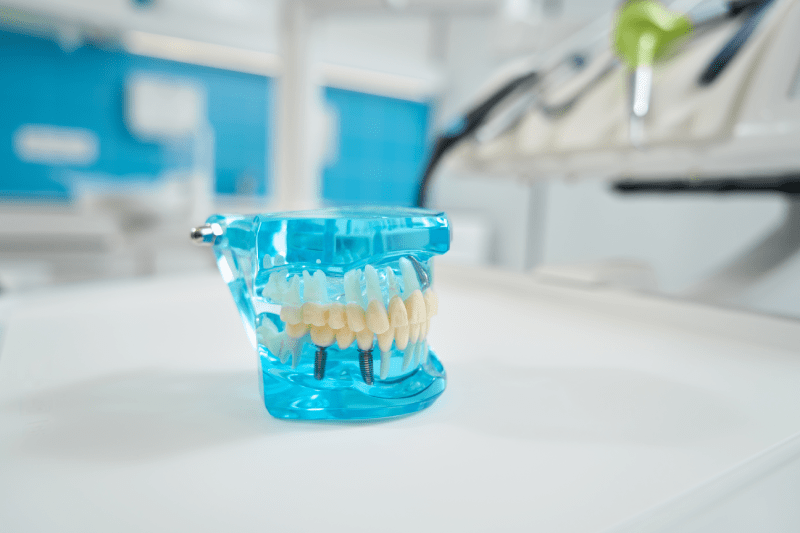
Do Implants Have a Longer Lifespan in Young Patients?
In young patients, due to their healthy bone structure and overall health, the lifespan of an implant is generally very long. With proper care and regular check-ups, implants can be used for a lifetime. Getting implants at a young age helps prevent the loss of natural teeth and preserves oral health.
Do Hormonal Changes in Elderly Patients Affect Implants?
In elderly patients, especially after menopause, hormonal changes can affect bone metabolism. This can lead to a weakening of the jawbone. However, if hormonal imbalances are under control and necessary bone grafting procedures have been performed, implant treatment can be successfully applied.
What is the Relationship Between Psychological Factors and Age in Implant Treatment?
As at any age, psychological factors are also important in implant treatment. In elderly patients, belief in the treatment, motivation, and patience affect the success of the process. In young people, aesthetic expectations and the adaptation process after treatment can be important. All patients should have open communication with their practitioner before treatment to share all their expectations.
What Are the Age-Specific Care Recommendations After an Implant?
Post-implant care is based on the same fundamental principles at all ages: regular brushing, flossing, and using a water flosser. However, elderly patients may have difficulty using these tools. The dentist can recommend easier-to-hold electric toothbrushes or special brushes in this case. These small adaptations ensure the longevity of the implants.
How Does Heavy Metal Exposure Affect Implant Treatment with Age?
Heavy metal exposure can accumulate in the body with age, negatively affecting general health and the ability to heal. This can make it difficult for the implant to fuse with the bone. It is important for patients who have been exposed to heavy metals to share this with their practitioner before treatment and for necessary precautions to be taken.
What Age Groups Should Be Cautious for Implant Treatment After Chemotherapy?
Implant treatment after chemotherapy carries risks for all age groups. Since these treatments affect the health of the jawbone and the capacity to heal, a careful evaluation is required regardless of age. An oncologist and dentist work together to determine the safest time for the treatment.
What is the Relationship Between Growth Plates and Implant Placement?
The growth plates at the end of the jawbone in children indicate that bone development is ongoing. Placing an implant while these plates are active can disrupt the growth pattern of the jawbone. Therefore, the dentist waits for these plates to close with radiological examinations and then determines the most suitable time for implant treatment.
Does the Duration of Being Toothless Change with Age?
The duration of being toothless causes jawbone resorption in every age group. However, since bone tissue regenerates faster in young people, bone resorption may be slower compared to the elderly. Nevertheless, being toothless for a long time is a factor that makes implant treatment more complicated regardless of age.
I hope this information answers your questions about whether your age is a barrier to implant treatment. Remember that no matter your age, you can have a healthy smile with the right treatment plan and professional support. To get personalized solutions for this process, you can contact Cure Holiday.
